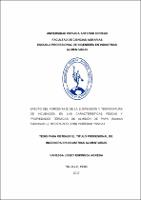Efecto del porcentaje de la suspensión y temperatura de incubación en las características físicas y propiedades térmicas de almidón de papa (solanun tuberosum L.) modificado (ANN) variedad yungay

View/
Download
(application/pdf: 1.505Mb)
(application/pdf: 1.505Mb)
Date
2017Author(s)
Espinoza Agreda, Vanessa Lisset
Metadata
Show full item recordAbstract
El objetivo de esta investigación fue evaluar el efecto del porcentaje de la
suspensión y la temperatura de incubación en las características físicas
(forma y tamaño de los gránulos, poder de hinchamiento y solubilidad) y
propiedades térmicas (temperatura y entalpía de gelatinización,
porcentaje de gelatinización) de almidón de papa modificado (ANN). Para
elaborar las muestras de almidón recocido (ANN) se prepararon
suspensiones de almidón extraído de papa variedad Yungay, a tres
concentraciones (20, 30 y 40 % p/p) para luego ser incubadas a tres
temperaturas (40, 50 y 60 °C) durante 8 horas. Las muestras tratadas,
posteriormente fueron centrifugadas (4000 rpm) durante 15 min. Los
almidones recocidos se lavaron una vez con agua destilada y se secaron
37 ºC durante 24 horas, luego se envasaron en frascos de vidrio de 250 g
de capacidad y almacenaron a temperatura ambiente para su posterior
análisis. El análisis estadístico indicó que el porcentaje de la suspensión
y la temperatura de incubación tuvieron efecto significativo en las
propiedades térmicas de almidón de papa modificado (ANN) y no en las
características físicas (tamaño y forma del gránulo). No se encontró efecto
significativo del porcentaje de la suspensión sobre poder de hinchamiento
y solubilidad. El tratamiento T9 (40%; 60 °C) presentó el mayor poder de
hinchamiento y el tratamiento T6 mayor solubilidad (sin diferencia
significativa con el tratamiento T9). Las muestras de almidón ANN
tratadas a la temperatura de 60 ºC (T7, T8 Y T9) mostraron mayores
valores de Ti, Tp y Tf de gelatinización que el almidón nativo.
Adicionalmente todos los tratamientos mostraron un incremento de los
valores de entalpía de gelatinización, con respecto al almidón nativo
(16.52±0.82 J/g), con excepción de las muestras sometidas a la
temperatura de incubación de 60 °C. The objective of this research was to evaluate the effect of suspension
percentage and incubation temperature on the physical characteristics
(granule shape and size, swelling power and solubility) and thermal
properties (gelatinization temperature and enthalpy, percentage of
gelatinization) of modified potato starch (ANN). To prepare samples
annealed starch (ANN) suspensions of starch extracted from Yungay
variety potato were prepared, at three concentrations (20, 30 and 40%
w/w) and then incubated at three temperatures (40, 50 and 60 °C) for 8
hours. The treated samples then were centrifuged (4000 rpm) for 15 min.
The annealed starches were washed once with distilled water and dried at
37 °C for 24 hours, then packed in glass jars of 250 g capacity and stored
at room temperature for further analysis. Statistical analysis indicated that
the percentage of the suspension and the incubation temperature had a
significant effect on the thermal properties of modified potato starch (ANN)
and not on the physical characteristics (size and shape of the granule). No
significant effect of the percentage of the suspension on swelling and
solubility was found. The T9 treatment (40%; 60 °C) had the greatest
swelling power and the T6 treatment had greater solubility (with no
significant difference with the T9 treatment). The ANN starch samples
treated at 60 °C (T7, T8 and T9) showed higher values of Ti, Tp and Tf
gelatinization than native starch. In addition, all treatments showed an
increase in the gelatinization enthalpy values, with respect to the native
starch (16.52 ± 0.82 J/g), except for the samples subjected to the
incubation temperature of 60 °C.
Collections
- Industrias Alimentarias [152]

